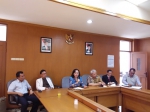ITB Award Honorary Doctor to Prof. Peter Agre (Nobel Laureate in Chemistry 2003)
By Abdiel Jeremi W
Editor Abdiel Jeremi W

Since the mid 19th century, man has speculated that human cells contain specific channels to transport water. This is confirmed by Peter Agre, a professor from John Hopkins University by isolating protein from cell membrane. By comprehending aquaporin mechanism on molecular level, knowledge of the mechanism of cells in living beings also develops. This invention supports the development of Biochemistry, Physiology, and Genetics in explaining various diseases such as diabetes insipidus and malaria.
 Inspiration from Professor Agre
Inspiration from Professor Agre
Prof. Agre presented a case on an organism with aquaporin deficiency, a work for which he and his colleague, Prof. Roderick MacKinnon (Rockefeller University) received the Nobel Prize. He continued his research on aquaporin with anopheles mosquito. Prof. Agre found that by reducing certain aquaporin from mosquito, it will cease to transmit malaria virus. According to him, it is a simple idea and can be reconstructed.
 On the same occasion, Prof. Peter Agre received Honorary Doctor from ITB for his remarkable dedication in Biochemistry and contribution to humanity. Born in 30 January 1949, Prof. Peter Agre was appointed as an Adjunct Professor in Chemistry. His arrival at ITB was a part of event series entitled “Bridges: Dialogues Towards a Culture of Peace” held by International Peace Foundation (IPF). This event aims to promote peace and scientific projects by various universities and research institutions related to conflict prevention or resolution strategy. During Q&A session, Prof. Agre encouraged students and young researchers to continue their accomplishments. “When you think in terms of a country’s most precious commodity, Indonesia’s most precious commodity is the young people,” said Prof. Agre in a press conference after the public lecture.
On the same occasion, Prof. Peter Agre received Honorary Doctor from ITB for his remarkable dedication in Biochemistry and contribution to humanity. Born in 30 January 1949, Prof. Peter Agre was appointed as an Adjunct Professor in Chemistry. His arrival at ITB was a part of event series entitled “Bridges: Dialogues Towards a Culture of Peace” held by International Peace Foundation (IPF). This event aims to promote peace and scientific projects by various universities and research institutions related to conflict prevention or resolution strategy. During Q&A session, Prof. Agre encouraged students and young researchers to continue their accomplishments. “When you think in terms of a country’s most precious commodity, Indonesia’s most precious commodity is the young people,” said Prof. Agre in a press conference after the public lecture.

.jpg)
.png)
.jpg)
.jpg)
.jpg)



